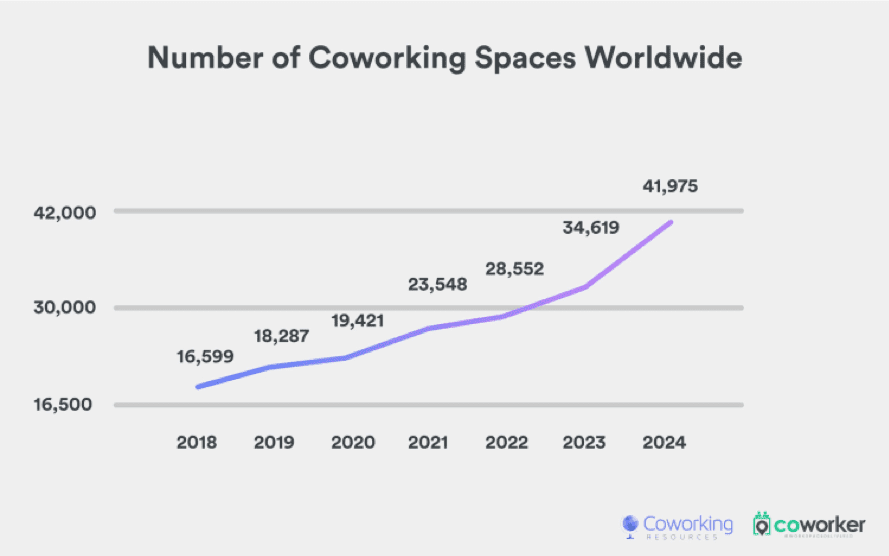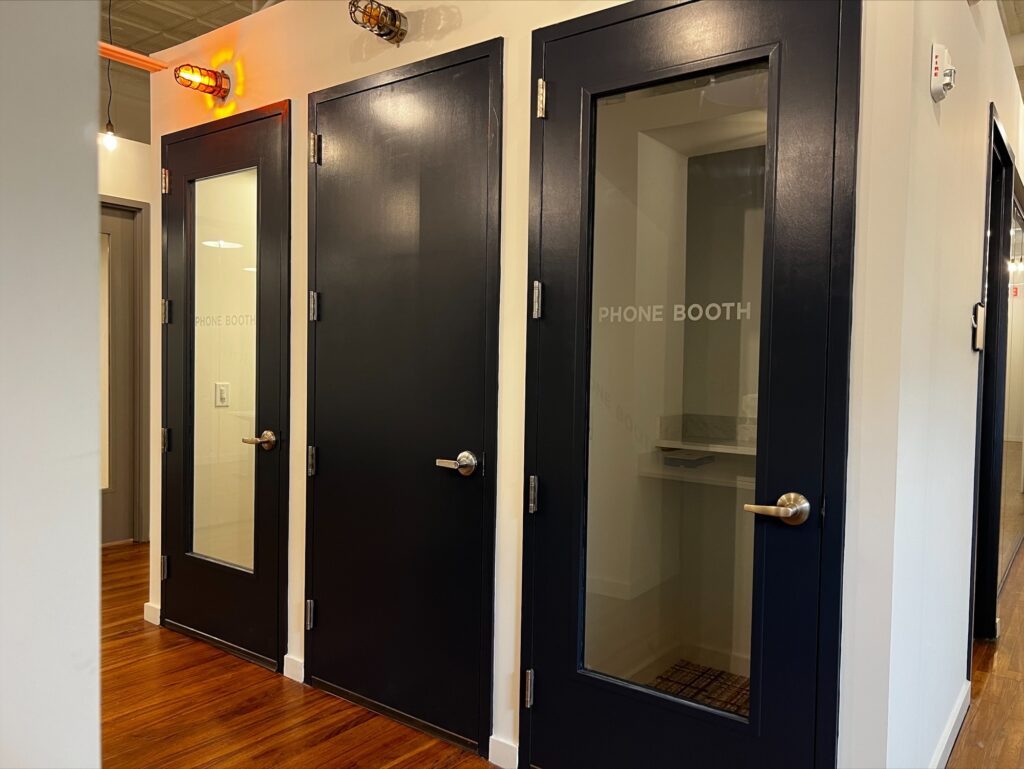The concept of coworking spaces has revolutionized the way people work in recent years. These shared work environments have gained immense popularity, providing entrepreneurs and freelancers with flexible and collaborative spaces to carry out their tasks. Take a look at what’s driving the success of coworking with these 11 trends.
The Rise of Coworking Spaces
Coworking spaces have marked a significant shift in traditional office setups. With the rise of freelancing, remote work and startups, individuals and small businesses began looking for flexible workspaces that provided more than just a desk and chair. Coworking spaces emerged as the ideal solution, offering an environment that fostered creativity, collaboration and networking opportunities.
Growth Chart of Coworking Spaces

According to the Global Coworking Growth Study done by CoworkingResources, there will be more than 40,000 coworking spaces worldwide by 2024. That’s double the growth since 2020. And by 2024, nearly 5 million individuals will be working from coworking spaces, up 158 percent from 2020.
These numbers tell the story: Year by year more people are trusting coworking spaces to enhance their productive working hours. And these top 11 trends show why.
Top 11 Trends Driving Coworking
1. Hybrid Workspaces
Coworking spaces offer flexible options for remote and in-person work, combining the best of both worlds to cater to diverse work preferences. Hybrid workspaces emphasize work/life balance, efficient utilization of time, work hour and location control, and more productivity. With a hybrid workspace, employees can work according to their own schedule, enhancing efficiency.
2. Wellness and Work/Life Balance
A key benefit of coworking spaces is the ability to strike a balance between work and personal life. These spaces often offer amenities like fitness areas, relaxation lounges, wellness programs, and healthy food options, promoting a holistic approach to well-being.
3. Niche and Industry-Specific Spaces
Specialized coworking spaces tailored to specific industries or communities are gaining popularity, offering targeted networking opportunities and resources.
4. Sustainability and Eco-Friendly Practices
With increasing awareness of environmental issues, coworking spaces are embracing sustainability as a core value. These spaces incorporate eco-friendly practices such as energy-efficient lighting, recycling programs, and the use of renewable materials. By promoting a green work environment, coworking spaces contribute to a more sustainable future.
5. Enhanced Technology Infrastructure
The future of coworking spaces lies in their seamless integration with technology. Advanced digital infrastructure, smart office solutions, and state-of-the-art communication tools enhance productivity and efficiency within these spaces. From high-speed wi-fi to cloud-based storage, technology enables seamless collaboration and supports productivity.
6. Customization and Personalization
Coworking providers are offering more options for personalized workspaces, allowing individuals and teams to design their environments based on their specific needs and preferences. Traditional office spaces often have limitations in terms of layout and design. Coworking spaces, on the other hand, offer greater choices in creating customized surroundings. Companies can design spaces that reflect their brand identity, culture and values, fostering a sense of belonging and pride among employees. Customizable spaces also allow for easy reconfiguration as the company’s needs evolve over time.

7. Collaboration and Community Building
Coworking spaces focus on fostering a sense of community by organizing networking events, workshops and knowledge-sharing sessions to facilitate collaboration among members. By bringing together individuals from diverse backgrounds and industries, these shared work environments create opportunities for networking, knowledge sharing and cross-pollination of ideas. Companies recognize the value of such interactions in driving creativity, problem-solving and innovation within their teams. Coworking spaces often provide a vibrant community atmosphere, with shared amenities, social events and networking opportunities. By establishing their own coworking spaces, companies can cultivate a supportive and inclusive work environment, fostering relationships among employees and enhancing their overall experience.
8. Flexibility in Membership Plans
Creating their own coworking spaces allows companies to have greater control over their office environment while providing flexibility in terms of lease agreements. More flexible membership options have been introduced, catering to the needs of different professionals, such as part-time memberships, day passes, and project-based plans. By adopting this approach, companies can scale their space requirements up or down based on their needs, avoiding the long-term commitment and financial burden associated with traditional office leases. This flexibility enables cost savings and better resource allocation.
9. Privacy and Soundproofing
To address the need for privacy and concentration, coworking spaces have incorporated private booths, soundproof rooms, and designated quiet zones for focused work.

10. Remote Work Support
With the rapid advancement of technology and the increasing demand for work/life balance, remote work has become more prevalent. Coworking providers offer specialized services and amenities to support remote workers, including virtual meeting tools, mail handling services, and professional mailing addresses. Many companies now offer flexible work arrangements, allowing employees to work from home or any location of their choice. As a result, the need for large, centralized office spaces has diminished, leading companies to explore alternative workspace solutions such as coworking.
11. Partnerships With Corporations
Coworking spaces are forming strategic partnerships with companies to provide satellite offices, remote work options for employees, and collaboration opportunities between startups and established organizations. These trends reflect the evolving needs of professionals in the coworking sector, aiming to create productive, flexible and community-oriented workspaces.
Coworking spaces are extending their impact beyond providing shared workspaces. As these trends show, coworking is redefining traditional work culture by fostering collaboration, flexibility and community building. And as professionals seek more meaningful and fulfilling work experiences, coworking spaces will continue to evolve, adapt and reshape the way we work.
Frequently Asked Questions
- Will coworking spaces become more popular in the future?
Yes, coworking spaces are likely to become more popular in the future. As the nature of work continues to shift toward remote and flexible arrangements, more professionals are seeking alternative workspaces that foster collaboration, networking and a sense of community.
- How will technology impact coworking spaces?
The role of technology is crucial in building the future of coworking spaces. Advanced technologies like AI and VR could enhance the collaborative experience by enabling virtual meetings and interactive work environments. Additionally, technology will facilitate seamless access to resources, smart-office management systems, and data-driven insights to optimize space utilization.
- Will coworking spaces offer more specialized amenities?
Yes, as the demand for coworking spaces grows, there is likely to be an increase in the availability of specialized amenities. These may include dedicated spaces for specific industries or professions, such as creative studios, maker spaces, wellness areas, and podcasting booths.
- How will coworking spaces contribute to innovation and entrepreneurship?
Coworking spaces have already become hubs for innovation and entrepreneurship, and this trend is likely to continue in the future. By providing a collaborative environment, access to diverse expertise, and networking opportunities, coworking spaces foster an ecosystem that supports the growth of startups, encourages knowledge exchange, and stimulates innovation.
- How will coworking spaces promote sustainability?
Coworking spaces of the future are expected to prioritize sustainability. This could involve incorporating eco-friendly design elements, utilizing renewable energy sources, implementing recycling and waste reduction programs, and encouraging sustainable commuting options such as bike sharing or electric vehicle charging stations.




